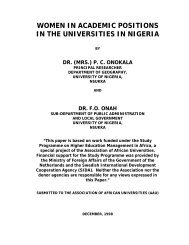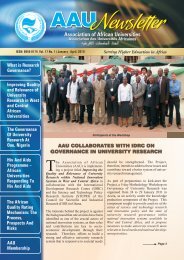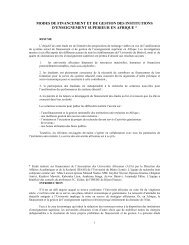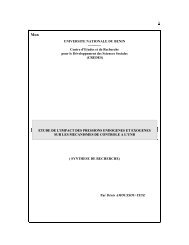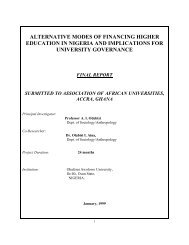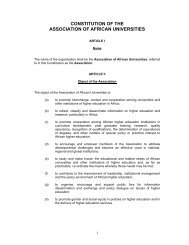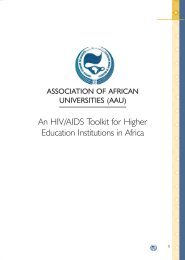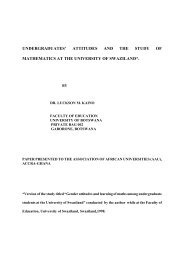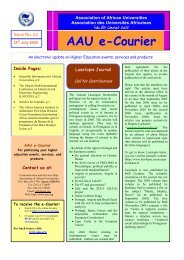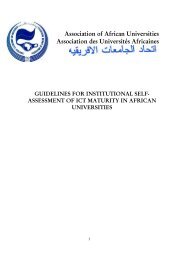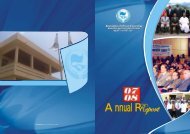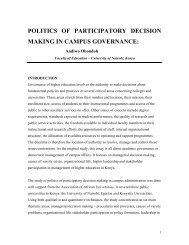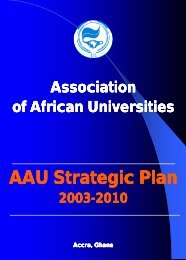governing teacher education colleges in south africa
governing teacher education colleges in south africa
governing teacher education colleges in south africa
You also want an ePaper? Increase the reach of your titles
YUMPU automatically turns print PDFs into web optimized ePapers that Google loves.
13<br />
governance is not just a matter of structural condition<strong>in</strong>g but a process of <strong>education</strong>al<br />
<strong>in</strong>teraction and negotiation among <strong>in</strong>terest groups. 13 In the South African case, the form<br />
and the content of this <strong>in</strong>teraction and negotiation depend not only on the policy<br />
framework, 14 but ma<strong>in</strong>ly on the backgrounds of the role-players (stakeholders), and how<br />
they perceive and <strong>in</strong>terpret their role <strong>in</strong> the governance process.<br />
With reference to this framework, I asked the <strong>in</strong>terviewees what they saw as key issues <strong>in</strong><br />
college governance. The pressures posed by GEAR on <strong>in</strong>stitutions emerged on the top of<br />
the list: “The most important would be the whole issue of efficiency…” Responses to GEAR<br />
(Growth, Employment and Redistribution) were very often l<strong>in</strong>ked to the ability to meet the<br />
challenges posed by the on-go<strong>in</strong>g process of transformation: “The really important th<strong>in</strong>g is that<br />
there is a lot of flexibility, the ability for <strong>colleges</strong> and m<strong>in</strong>istries and other authorities to<br />
actually respond quite quickly to changes.” The follow<strong>in</strong>g is seen as essential to meet these<br />
challenges:<br />
A visionary leadership: “… what I regard as very necessary is vision and leadership, the<br />
required know-how and the experience of everybody <strong>in</strong>volved with <strong>teacher</strong> <strong>education</strong>; to<br />
elaborate on this I would say very broadly that … the first and the most important th<strong>in</strong>g here is<br />
that we should establish a true tertiary character of our <strong>colleges</strong>. As you know, most of our<br />
<strong>colleges</strong> are governed like schools…” Or, “ What I also regard as very important is the fact that<br />
there should also be a true professional character … and the necessary academic<br />
foundation should also exist at a college of <strong>education</strong>.”<br />
Quality students and staff: “We need well qualified and experienced and competent staff<br />
at our <strong>colleges</strong>, that is to my m<strong>in</strong>d the most important; then of course we also need<br />
dedicated students … of outstand<strong>in</strong>g or high quality.”<br />
Enabl<strong>in</strong>g structures: “In the times that we are at the moment we need governance structures<br />
which are <strong>in</strong>novative…”<br />
Authority and accountability: “The one would be that there are already clear l<strong>in</strong>es of both<br />
authority and accountability, between the different levels.”<br />
Role of the community: “Community <strong>in</strong>volvement at our <strong>colleges</strong> of <strong>education</strong> is also very<br />
12 These are key governance concepts developed by Margaret Archer. There is enough evidence to<br />
suggest that these concepts and also those concepts such as political manipulation, <strong>in</strong>ternal <strong>in</strong>itiation, and<br />
external transactions, used by Archer at a macro level to expla<strong>in</strong> the dynamics of systems change, can<br />
also be applied to the micro or <strong>in</strong>stitutional level of <strong>education</strong>al change. For details on these concepts see<br />
Jane Hofmeyr, "The application of Margaret Archer´s theory to South African <strong>education</strong>", mimeo,<br />
EDUPOL, 1991; P Buckland and Jane Hofmeyr, "The governance...," op cit; and M S Archer, Social<br />
Orig<strong>in</strong>s of Educational Systems (London: Sage, 1979).<br />
14 In South Africa, only general pr<strong>in</strong>ciples are prescribed at the policy level.<br />
13



